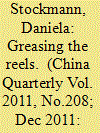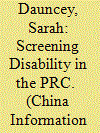|
|
|
Sort Order |
|
|
|
Items / Page
|
|
|
|
|
|
|
| Srl | Item |
| 1 |
ID:
114574


|
|
|
|
|
| Publication |
2011.
|
| Summary/Abstract |
This article examines a major change in campaigning through the means of mass media during the reform era. As the media commercialized and partially privatized, the state has tried increasingly to involve societal actors in the production of public service advertisements (PSAs) on television. Today, PSA campaigns are initiated by state and Party units, but their funding, production and broadcasting is made possible by a collaborative effort between broadcasters, advertising companies and commercial enterprises who voluntarily support their further development. I conducted 27 in-depth interviews with officials, broadcasters and producers in Beijing to tap into the policy rationale behind the use of public service advertisements in campaigning and the incentive structure facilitating collaboration between companies and state units. Interviews with judges of PSA competitions and content analysis of price-winning advertisements reveal the standards of the central government to employ public service advertising as a means of campaigning.
|
|
|
|
|
|
|
|
|
|
|
|
|
|
|
|
| 2 |
ID:
079930


|
|
|
|
|
| Publication |
2007.
|
| Summary/Abstract |
This article outlines the political, social, economic, and cultural factors affecting disability representation in Chinese cinema from the founding of the PRC onwards, particularly after 1976. With reference to a wide variety of films that include main characters with visual, hearing, speech, physical, and learning impairments, it demonstrates how socialist realism, the equation of a "healthy" body with a healthy nation, and the great economic endeavor of the Mao era all contributed to the limitation of disabled people on the big screen, whilst the opening-up reforms, spiritual civilization campaigns, and commercial and critical demands of the post-Mao era effectively promoted their inclusion. At different times, the marginality of disabled people has resulted in them being overlooked as irrelevant, rejected as impaired, employed as a political tool, or identified as a marketable commodity. The representation or nonrepresentation of disability in Chinese film is closely linked to the politics of looking good
|
|
|
|
|
|
|
|
|
|
|
|
|
|
|
|
|
|
|
|
|